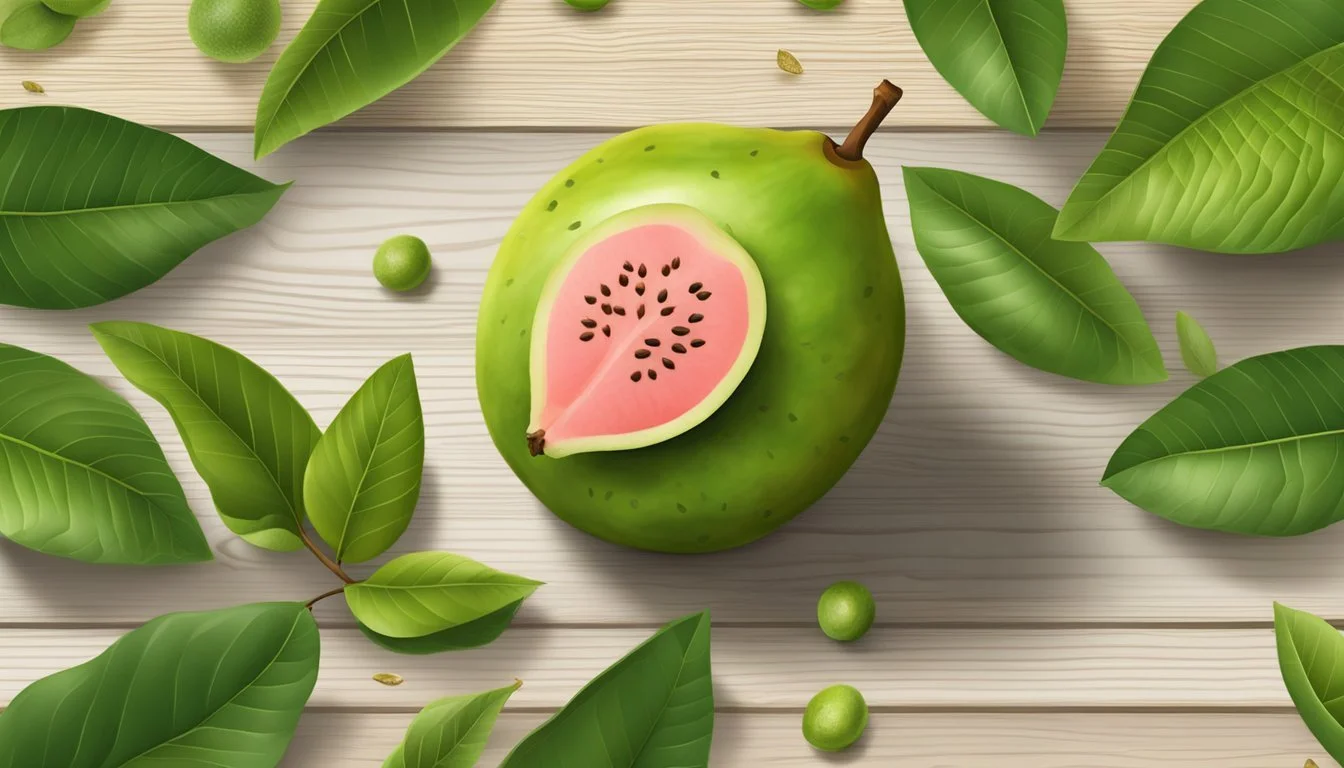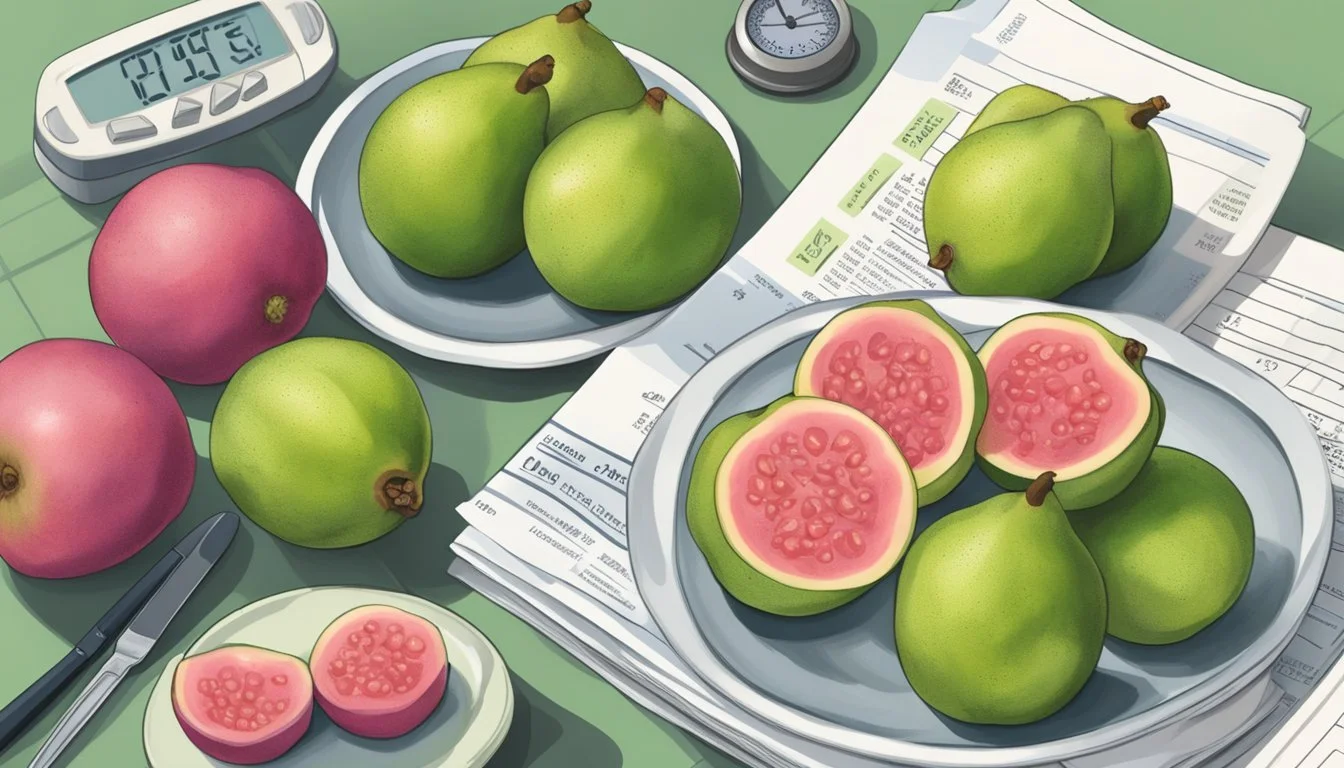Can Diabetics Eat Guava?
Benefits and Considerations
Managing blood sugar levels is a critical aspect of diabetes care, and diet plays a significant role in this process. Guava, a tropical fruit, has been identified as a potentially beneficial addition to a diabetic diet. This is attributable to its low glycemic index, which means it has a slower, lesser impact on blood sugar levels compared to foods with a high glycemic index. Moreover, the dietary fiber content in guava supports digestive health and can aid in the regulation of blood glucose levels, which is particularly important for individuals with diabetes.
Guavas are also celebrated for their nutrient-dense profile. They are rich in vitamins, minerals, and antioxidants, while also being low in calories, which makes them a favorable option for weight management—an important factor in diabetes management. The fruit contains a considerable amount of potassium and a low level of sodium, which is a beneficial combination for maintaining healthy blood pressure, often a concern for those with type 2 diabetes.
Furthermore, studies have suggested that consuming guava without the peel may reduce sugar absorption in the bloodstream, offering another advantage for diabetics seeking to control their blood sugar spikes. While it appears to be a beneficial fruit for those managing diabetes, individuals should still consume guava in moderation and as part of a balanced diet, tailored to their specific health needs. As with any dietary changes, it is advisable for diabetics to consult healthcare professionals before integrating new foods into their diet.
Understanding Diabetes
Diabetes is a chronic condition characterized by elevated levels of blood sugar (glucose) due to the body's inability to produce or properly use insulin. Effective blood sugar control is crucial for managing the condition and reducing the risk of long-term complications.
Types of Diabetes and Their Differences
Type 1 Diabetes: The immune system destroys insulin-producing cells in the pancreas, leading to insulin deficiency. Patients typically require lifelong insulin therapy.
Type 2 Diabetes: The body becomes resistant to the effects of insulin or doesn't produce enough. It's often associated with obesity and may be managed with diet and lifestyle changes alongside medication.
The Role of Diet in Managing Diabetes
Dietary choices have a substantial impact on blood sugar levels and diabetes management. Individuals with diabetes must select foods that:
Support steady blood sugar levels: Foods with a low glycemic index such as non-starchy vegetables and some fruits.
Contain healthy fats and lean proteins: To balance out glucose absorption and improve satiety.
Monitor and Interpret Blood Sugar Levels
Routine monitoring enables individuals to understand how their body reacts to different foods and activities. Here are key considerations:
Regular Testing: Checking blood sugar levels multiple times a day using a glucometer.
Recognizing Patterns: Identifying how specific foods and meal timing influence blood sugar levels.
The Nutritional Profile of Guava
Guava stands out for its rich vitamin and mineral content, high dietary fiber, and potent antioxidants, which combine to offer notable nutritional benefits.
Vitamins and Minerals in Guava
Guavas are a powerhouse of essential vitamins and minerals, contributing to their reputation as a superfruit. They are particularly rich in vitamin C, with one guava fruit providing more than twice the daily recommended intake, supporting immune function and skin health. They also contain substantial amounts of vitamin A, which is crucial for eye health, and vitamin B6, necessary for brain development and keeping the nervous system in good shape. The minerals in guava are not to be overlooked, as the fruit provides a significant amount of potassium — a key player in heart health — and also contains magnesium, calcium, manganese, and iron, all of which have various health benefits ranging from bone health to oxygen transport.
Mineral Importance Potassium Regulates blood pressure and heart function Magnesium Supports muscle and nerve function Calcium Essential for bone health Manganese Aids in bone formation and blood sugar regulation Iron Crucial for blood production and oxygen transport
Fibre Content and Its Importance
In terms of fiber, guava is highly endowed, with one fruit containing up to 12% of the recommended daily intake. Dietary fiber is a key component for maintaining healthy blood sugar levels, which is particularly beneficial for individuals with diabetes. The fiber in guava slows down the digestion and absorption of sugar into the bloodstream, preventing sudden spikes in blood glucose. Additionally, the high fiber content contributes to a feeling of fullness, which can aid in appetite control and potentially support weight management efforts.
Antioxidant Properties of Guava
The antioxidant properties of guava are attributed to the presence of lycopene, vitamin C, and various polyphenolic compounds. Lycopene is a powerful antioxidant that has been associated with a reduced risk of chronic diseases. Guava's antioxidants help neutralize harmful free radicals in the body, potentially reducing the risk of cancer, heart disease, and other health conditions. Its antioxidants also play a role in anti-inflammatory processes and overall health maintenance.
Guava and Blood Sugar Control
Guava, a tropical fruit, has gained attention for its potential to manage blood sugar levels due to its low glycemic index and effects on insulin and metabolism.
Low Glycemic Index of Guava
The glycemic index (GI) is a measure that ranks foods on a scale from 0 to 100 based on the speed at which they raise blood sugar levels after eating. Guava is classified as having a low GI, which indicates that it is digested and absorbed at a slower rate, leading to more gradual changes in blood sugar levels. This slow absorption process can be particularly beneficial for individuals with diabetes as it helps in maintaining stable blood sugar levels.
How Guava Affects Insulin and Metabolism
The fiber content within guava plays a significant role in how it affects insulin and metabolism. Fiber aids in the slow release of sugar into the bloodstream, providing a steady stream of energy and preventing spikes in blood sugar that can result in heightened insulin response. Moreover, the low caloric content and high nutrient density of guava contribute to overall metabolic health, which is essential for the effective management of diabetes.
Health Benefits Beyond Blood Sugar
In addition to aiding blood sugar management, guava offers a range of other health benefits that contribute to overall well-being.
Heart Health and Blood Pressure
Guava is beneficial for heart health due to its high potassium content, which helps regulate blood pressure levels. The fruit's richness in vitamins and antioxidants also supports heart function and may reduce the risk of heart disease.
Weight Management and Guava
The low calorie count and high fiber content of guava make it an ideal snack for weight management. Fiber helps in feeling full, reducing the likelihood of overeating, which can contribute to a healthy weight loss regimen.
Guava for Digestive Health
Rich in dietary fiber, guava promotes healthy digestion and can alleviate constipation. Its anti-inflammatory properties also benefit the digestive system, helping to maintain gut health.
Guava's Role in Cancer Prevention
Guava contains lycopene, an antioxidant with cancer-fighting properties. Research suggests a link between the intake of lycopene and a reduced risk of certain cancers, making guava a potentially protective food against cancer.
Immune System Strengthening
The high vitamin C content in guava is crucial for immune system function. This nutrient also has strong antioxidant capabilities, bolstering the body's natural defenses against illness.
Incorporating Guava into a Diabetic Diet
Guava is a valuable addition to a diabetes diet due to its low glycemic index and high dietary fiber content. It provides essential nutrients without rapidly increasing blood sugar levels, making it an ideal snack or complementary food.
Ideal Portion Sizes and Frequency
Guava's nutrient composition allows it to be incorporated into a diabetic diet sensibly. A portion size of one medium-sized guava per serving is considered adequate. Individuals should limit consumption to no more than two servings per day to prevent excessive intake of natural sugars. They should consult with a nutritionist to tailor portion sizes to their specific dietary needs.
Complementary Foods and Balanced Diet
When adding guava to a meal, it should be part of a balanced diet, complementing other low-glycemic index foods to manage overall carbohydrate and calorie intake. For breakfast, one might pair guava with a serving of nuts, ensuring an intake of healthy fats and proteins. Guava can also be diced into a salad for a nutritious, low-calorie snack. Such combinations help maintain a stable blood sugar level and contribute to overall health.
Breakfast: Half a guava, whole-grain toast, handful of nuts
Snack Option: Diced guava in a salad with leafy greens
What to Avoid When Eating Guava
To preserve the benefits of guava in a diabetes diet, avoid pairing it with high-sugar or high-carbohydrate foods that could spike blood sugar levels. Avoid processed snacks or those with added sugars when eating guava. It's best to consume the fruit in its whole form rather than as juices or purees, which may lack dietary fiber and have higher concentrations of natural sugars, affecting their glycemic index.
Alternative Forms and Derivatives of Guava
Guava comes in various forms and derivatives, each offering unique benefits and considerations for diabetic individuals.
Guava Leaves and Herbal Tea Benefits
Guava leaves are a valuable derivative of the guava plant. They are often brewed to create herbal tea that may provide health advantages for managing diabetes. The leaves contain compounds that have been studied for their potential to reduce blood glucose levels. Herbal tea made from guava leaves can be a soothing, low-calorie beverage option for diabetics.
Guava Juice Versus Whole Guava Fruit
Consuming guava juice may offer some nutritional benefits, as it is derived from the nutrient-rich guava fruit. However, diabetics should be mindful of the sugar content in the juice, which is typically higher than that in the whole fruit. The whole guava fruit, with its rich dietary fiber, assists in the slow absorption of sugars, making it a more balanced choice for blood sugar management.
Guava in Baked Goods and Snacks
Incorporating guava into baked goods and snacks can provide a flavorful and healthier alternative for diabetics. Guava puree can be used as a natural sweetener to reduce the amount of added sugars. Snacks made with pieces of guava fruit or guava-infused products offer a fiber-rich treat that aligns well with a diabetic diet. When used in baked goods, its high pectin content can improve texture while adding nutritional value.
Potential Risks and Side Effects
While guava is generally safe for diabetics and beneficial in managing blood sugar levels, certain circumstances may require caution. Below are some considerations for diabetics thinking about including guava in their diet.
When Guava Might Not Be Advised
Diabetics should monitor their fruit intake to ensure they do not consume it in excess, as this could potentially affect their blood sugar levels. Despite guava's low glycemic index, overconsumption can still lead to an increase in blood sugar. Healthcare providers sometimes advise patients to limit guava intake if they have difficulty managing their blood glucose levels or have been advised to follow a specific diet.
Interactions with Medication
Guava can interfere with certain medications due to its blood sugar-lowering effect. Diabetics on hypoglycemic drugs may experience an additive effect, causing their blood sugar to drop too low. It is critical to consult a healthcare provider about potential drug interactions. Healthcare providers might recommend adjusting medication dosages accordingly.
Medications that may interact:
Insulin
Oral diabetes drugs
Allergies and Individual Sensitivities
Although rare, some individuals may show an allergic reaction to guava. Symptoms can include itching, swelling, and gastrointestinal distress. Anyone with a known allergy to guava should avoid it altogether. Individuals with a history of fruit or pollen allergies may want to get tested for a guava allergy before incorporating it into their diet.




